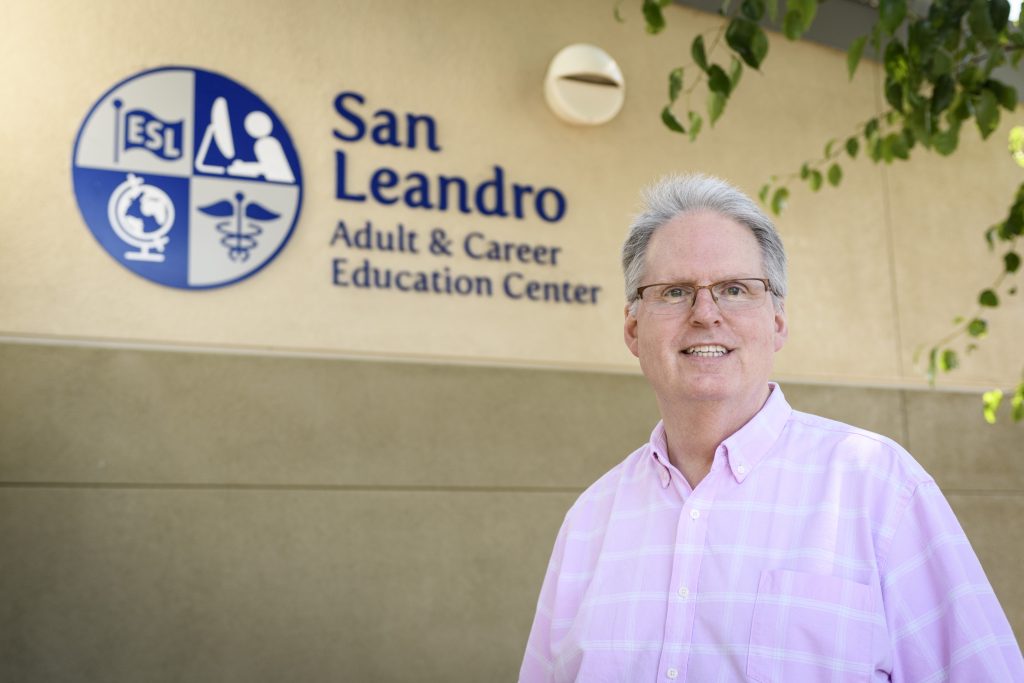San Leandro Adult School Principal Bradley Frazier was inspired to help adult students by his own grandmother’s language barrier

Having worked in education for more than 30 years as a teacher and administrator, San Leandro Adult and Career Education Center Principal Bradley Frazier has witnessed firsthand the transformative power of adult schools.
Frazier peppers conversations about his vocation with sometimes heart-warming success stories of the students he’s met—like people who’ve enrolled while experiencing homelessness and secured a job in less than three months through career training programs; a 50-something father of five who earned his high school diploma; and 100-year-old students who take English as a second language classes to better communicate with family and their community.
“You can see our students flourishing,” says Frazier, who’s been in his current position for 19 years. “They’re excited, they’re learning, they’re transitioning, they’re teaching their children … it transforms their entire lives.”
“You can see our students flourishing. They’re excited, they’re learning, they’re transitioning, they’re teaching their children … it transforms their entire lives.”
Bradley Frazier, Principal, San Leandro Adult and Career Education Center
San Leandro Adult Education is one of a dozen schools, along with adult schools, ROP programs and community colleges that make up the Mid-Alameda County Consortium (MACC). The primary curriculum at these schools is dedicated to Career Technical Education (CTE), English as a second language (ESL), basic education, high school equivalency training and testing and programs for adults with disabilities. The MACC includes the K-12 schools districts in Castro Valley, Dublin, Hayward, Livermore Valley, New Haven, Pleasanton, San Leandro, and San Lorenzo, along with the Eden Area and Tri-Valley Regional Occupation Program (ROP) programs, and Chabot and Las Positas colleges.
Frazier says he was spurred to teach adults, and ESL particularly, by his grandparents’ personal experience. They came to the United States from Portugal and his grandmother struggled with the English language her whole life. “I didn’t want people to have to be like my grandmother, and not know how to read and write and communicate, and so I decided to go into teaching ESL.”
Frazier characterizes the instructors and support staff he works with as “compassionate” and explained the wrap-around services they provide or connect students to extend far beyond the classroom: “Students can meet one-on-one with advisors that help then with everything from homework in the class to what classes they should take next to whatever personal issues they’re having or family issues.
“If the students open up to the academic advisors, to our transition specialists, there’s a whole new world of services available to them.” Frazier says. “We can help connect them with housing, food, medical and clothing, and we help them find jobs, even while they’re in school.”
Frazier notes these wrap-around services aren’t only provided by the school, but through community partnerships and referrals to other agencies. Primary among the MACC’s essential partners is the Alameda County Workforce Development Board (ACWDB).
The economic crisis of 2009 almost led to the death of adult schooling in California, as the state moved towards gutting funding for the programs. Compromise legislation passed in 2013 and 14 led to the system being restructured into 71 regional adult education consortia, of which the MACC is one. These consortia had to continue providing their services with reduced funding and a stronger emphasis on career training, leading to prosperous partnerships with regional workforce boards.
The ACWDB supports community-based organization Rubicon Programs, which helps connect students to MACC schools with the help mentioned above. Rubicon operates the Eden Area America’s Job Center of California (AJCC) in Hayward on behalf of the ACWDB.
MACC Director Tim Combs emphasizes the importance of working with the ACWDB and Rubicon to access the region’s Title I Workforce Innovation and Opportunity Act (WIOA) program resources. “WIOA helps job seekers access employment, education, training, and support services to succeed in the labor market and helps match employers with the skilled workers they need. The AJCC (Rubicon) refers people to our schools through WIOA individual training accounts. They also work with MACC to host employer hiring events, and participate in several of our planning workgroups.”
“We make student referrals to the AJCC, and if they qualify for the services then WIOA can help pay for the education or training program,” Combs continues. “We have numerous students who are being funded by WIOA for a variety of career technical programs, including healthcare and business programs. And between the AJCC and MACC’s adult education schools, we’re trying to make it so there’s little to no cost and remove all barriers to student success.”
Combs says the MACC is constantly evolving to provide better services and
opportunities for its students, and the key to this ongoing, positive change is
partnerships: “Through collaboration, we’re able to really look at the landscape of what programs are currently being offered and see where there are opportunities to help address regional needs through new programs.”
The San Leandro Adult and Career Education Center is part of the Mid-Alameda County Consortium (MACC), one of 71 consortia of adult education providers across the state. The MACC includes Chabot College, Las Positas College, Eden ROP, Tri Valley ROP, and the adult schools in Castro Valley, Dublin, Hayward, Livermore, New Haven, Pleasanton, San Leandro, and San Lorenzo. For more information about the San Leandro Adult and Career Education Center, go to www.slusd.us/sladultschool/. For more information about the MACC and its member schools, go to www.macc4ae.org.
Written by Jeff vonKaenel and Ken Smith
| Regions | Classes & Topics |
|---|---|
| Bay Area California | English as a Second Language – Variety of Classes |